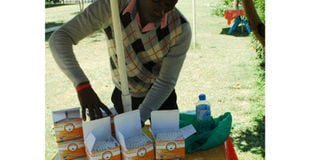Chalk giving teachers a lifeline

One of the teachers packs chalk ready for sale. PHOTO BY MARTINS E. SSEKWEYAMA
While many teachers across the country are anxiously waiting for the fulfilment of government’s commitment to increase their salaries, Francis Ssematimba, has started on the journey of transforming his and fellow teachers’ lives.
Ssematimba 38, heads Butale Mixed Primary School, a Catholic-founded school in Kabonera Sub-county, Masaka District. He has been the school’s head teacher for the last three years.
He reveals that at the peak of the 2014 teachers’ industrial action, whose effect were devastating for pupils, his mind started thinking of how he would be of importance towards devising a sustainable remedy to this problem which showed no clear indicator that it was about to end.
Ssematimba says he resolved to look for a project affordable by even an ordinary teacher.
At first he thought of selling the idea of poultry and piggery projects to the teacher’s union leadership in Masaka District but he realised that besides subscribing to different religious denominations, they could still be frustrated by lack of the required startup capital and long animals’ gestation period.
“Because I had already taken up piggery at my backyard, I went to sell the idea to a few of my Christian confidants, but some of them shied away from taking up the highly tedious and untidy project,” he says.
Hatching the idea
One Saturday late last year while attending to his piggery project, Ssematimba says he developed an idea of manufacturing materials that are directly in line with his profession, which pose no limitations to the targeted group.
“My memory quickly recalled a chalk brand that used to be manufactured by the Catholic nuns at Bwanda Convent in Kalungu District sometime back which idea they later dropped in favour of the booming bottled water business,” he narrates.
Ssematimba sold the chalk idea to three of his staff members, who embraced it and agreed to give it a try.
The group resolved to start a mini-savings scheme at the school from which to raise the capital. By July last year, they had raised Shs600,000 and they started on the project implementation.
“My primary intention was to start a project that would substantively supplement teachers’ meagre salaries without necessarily abandoning the profession,” he adds.
After months of gambling and mixing various ingredients, the group finally unveiled their locally manufactured “chalk brand” during celebrations to mark the Masaka District Teachers’ Day at Sports Club Grounds in November last year.
Sematimba was, however, reserved about the details of the whole manufacturing process.
He only reveals that they make the chalk out of calcium carbonate mineral (lime) whose deposits are in Rakai District, with other chemicals they obtain from Kampala.
At the moment, Sematimba says they are using elementary manufacturing mechanisms such as drying the chalk under sunshine, but they are in the process of procuring a modern machine to boost their production and be able to satisfy the wider market.
The group is currently comprises 11 members, all of whom are teachers who take part in the manufacturing process at weekends.
Sematimba reveals that they have embarked on the process to secure certification from the Uganda National Bureau of Standards such that they can freely sell their chalk and fulfill their dream of economically liberating the teachers.
“We have plans of making a fixed cottage industry and we want to bring on board other groups of teachers to acquire the skills that will enable us overcome the financial challenges we are faced with,” he says.
Making the sales
On average, Ssematimba says the group produces 200 boxes of chalk each with 50 pieces in one month, but their target is producing at least one ton such that they capture the whole local market.
“Now that we can consume our own chalk brands, its time non-teachers are eliminated from dealing in scholastic materials.
If Masaka takes up chalk manufacturing, and the another region takes up making books, another concentrates on soap among other projects; these recurrent lamentation will be no more,” he adds.
A box of chalk costs Shs500, far below the other brands which are sold at Shs3,000.
“If government can support such projects, the teachers can have capacity to improve their lives without relying on salaries,” says Beatrice Nabbona, one of the project co-proprietors, and a teacher at Misaali Primary School.
Currently, the chalk boxes are branded with the Uganda National Teachers’ Union logo, for purposes of creating an appealing impression to all Unatu members.




